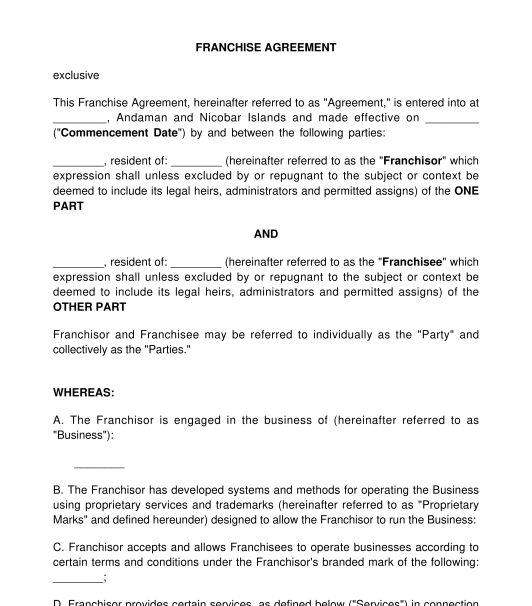 26-01-2025
26-01-2025

Answer a few questions and your document is created automatically.

Your document is ready! You will receive it in Word and PDF formats. You will be able to modify it.

 26-01-2025
26-01-2025
 Word and PDF
Word and PDF
 15 to 23 pages
15 to 23 pages



A Franchise Agreement is a document between two main parties, the party that will be franchising out their already well-developed business model, called the franchisor, and the party that will be agreeing to certain terms and conditions in order to create their own franchised business based on that business model. In a franchise agreement, the franchisor lays out the expectations and requirements for a franchisee to run a business under their brand name. It can be any type of business and often, restaurants or small retail outlets are run as franchises.
Within these agreements, the franchisor and the franchisee each outline their expectations for behaviour and agree to the bounds of the relationship between them. Mostly, it is the franchisor describing rules the franchisee must follow, but there are also certain portions of the agreement that relate to the protection of the franchisee.
No, it is not mandatory. However, it is essential to have a written Franchise Agreement to ensure a clear understanding and enforcement of the franchising relationship. Since it is complicated, a written agreement will avoid any potential disputes in future.
A franchisor is a company or individual that owns the brand, trademark, and business, and allows another party to operate under the same brand and trademark under certain conditions. The franchisor is responsible for developing and maintaining the overall business structure.
A franchisee is an individual or entity running a business in the name of a franchisor business by paying upfront payment, and recurring payments to the franchisor.
The Franchise Agreement shall not include any clauses that violate consumer protection acts or rules, or which put excessive restrictions on the franchisee from doing other business, something not related to the business mentioned under the Franchise Agreement.
Any individual above the age of 18 years and an entity registered in India can enter into a Franchise Agreement.
The duration of the Franchise Agreement varies from transaction to transaction. The parties can decide the period as a fixed period, or continuous business with an option to terminate by either party on certain grounds. Typically, most of the Franchise Agreements are entered for a longer duration such as 3 years, 5 years, etc.
The Franchise Agreement will be legally binding when it has been printed on non-judicial stamp paper or e-stamp paper signed by both the Franchisor and the Franchisee and has been dated. The value of the stamp paper would depend on the state in which it is executed. Each state in India has provisions in respect of the amount of stamp duty payable on such agreements. Information regarding the stamp duty payable can be found on the State government websites.
Both the Franchisor and the Franchisee should keep a signed copy of the Franchise Agreement. In order to do this, two different copies can be signed, or if only one copy is signed, it can be photocopied and then distributed between the parties.
Yes, a Franchise agreement can be terminated. The Franchise agreement is mainly terminated on the following grounds:
A Franchise Agreement should include the following clauses:
Franchise agreements in India are subject to the Competition Act, 2002, Indian Contract Act, of 1872 and general contract principles as well as laws protecting intellectual property rights such as the Copyrights Act, 1957 and the Trademarks Act, 1999.
You fill out a form. The document is created before your eyes as you respond to the questions.
At the end, you receive it in Word and PDF formats. You can modify it and reuse it.
A guide to help you: What to do after Finishing a Contract?
Franchise Agreement - Sample, template - Word & PDF
Country: India